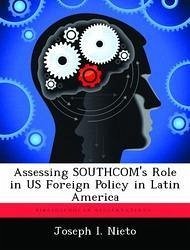Nicht lieferbar

Anticipating Failed States in Latin America - Implications for Southcom Strategy
Versandkostenfrei!
Nicht lieferbar
With the exception of Cuba, US-Latin American relations do not have the specter of Communist influence in the hemisphere distorting the thrust of foreign policy. What does remain is the threat of crises that endangers the viability of the fledgling democracies throughout the continent. The US National Security Strategy of 1999 lists transnational issues such as narcotics trafficking, corruption, illegal immigration, organized crime, terrorism, and adherence to the rule of law as the primary security concerns in the region. These issues threaten the economic vitality of the region, which is vit...
With the exception of Cuba, US-Latin American relations do not have the specter of Communist influence in the hemisphere distorting the thrust of foreign policy. What does remain is the threat of crises that endangers the viability of the fledgling democracies throughout the continent. The US National Security Strategy of 1999 lists transnational issues such as narcotics trafficking, corruption, illegal immigration, organized crime, terrorism, and adherence to the rule of law as the primary security concerns in the region. These issues threaten the economic vitality of the region, which is vital to maintaining the momentum of democratization. This monograph defines the model of intra-state conflict as described by historian and social scientist Crane Brinton. His book, The Anatomy of Revolution, provides a useful framework to understand the nature of intra-state conflict. After describing Brinton's work, this monograph introduces the concept of the failed state, which affords Brinton's model fundamental differences in the initial stages of intra-state conflict. Finally, this monograph introduces the concept of Latin American authoritarian rule as manifested through the military strongman.









